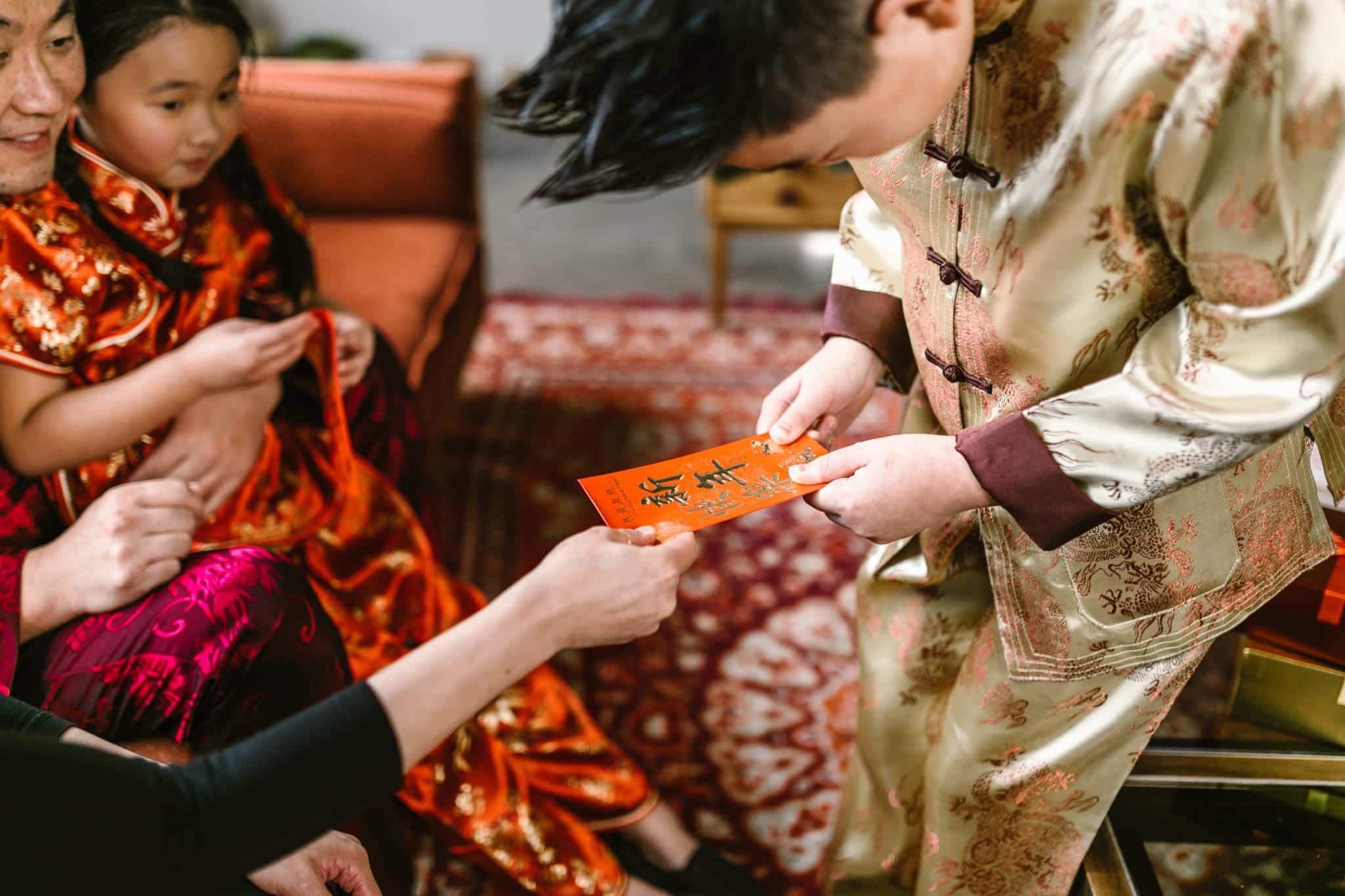How should a Christian celebrate Chinese New Year?
Salt&Light wishes all readers a blessed Lunar New Year!
Assistant Pastor Patrick Chan Yin // January 30, 2024, 11:56 am

Can we as Chinese Christians celebrate Chinese New Year, especially when there are aspects steeped in idol worship and pagan practices? Here are some points to consider while enjoying time with our loved ones. Photo by RDNE Stock Project on Pexels.
As I was passing by the West Coast market, I saw a big statue of the Chinese god of prosperity that had been erected to greet people.
I could not help but notice some people bowing before it, perhaps whispering a quick prayer of blessing or prosperity to be granted to them this year.
Which ones are harmless traditions and which ones are mere superstitions?
Others were going around the statue to read the good (or bad) fortune notes (and suggested lucky 4D numbers) of their zodiac signs that the Chinese fortune tellers and mediums gave, in the hope that this coming year would be a more prosperous year for them.
(I must admit that I, too, was very much tempted to read about my own zodiac sign and to see whether I would have a “favourable” year!)
Amid all this, one thought came to my mind: Can we as Chinese Christians celebrate Chinese New Year, especially when there are aspects of Chinese New Year celebrations steeped in idol worship and pagan practices that focus on ushering in good luck and prosperity?
How much should we follow these customs and practices? Which ones are harmless traditions and which ones are mere superstitions?
While not exhaustive, I find the following points quite helpful and would like to share them with those of us wrestling with the same questions.
1. Understand each practice’s underlying beliefs*
The Chinese Christian must have a correct understanding of Chinese traditions and their significance so that he or she can deal with these issues wisely from a biblical standpoint and be a good witness and testimony for Jesus Christ.
This includes understanding the original beliefs of, and current attitudes towards, Chinese New Year practices. The aim of this is to discern whether any of these practices violate biblical principles, or whether they are religious and cultural practices.
Let us examine a few popular Chinese New Year practices.
Spring cleaning
Spring cleaning in preparation for the Chinese New Year is an acceptable practice, as long as we do not get caught up in the superstitious belief that if we sweep the floor during Chinese New Year, we will lose our blessings and good fortune.
It is the Lord who gives us our wealth (Proverbs 22:2 – “Rich and poor have this in common: The Lord is the Maker of them all.”).
Eating yu sheng
Concerning the eating of yu sheng, which is a symbol of prosperity: While it is not wrong to ask the Lord for spiritual and financial prosperity and well-being, we must be careful not to be unduly concerned about material wealth and success.
And as the Lord blesses us, we are to practise what Deuteronomy 8:18 says: “But remember the Lord your God, for it is He who gives you the ability to produce wealth, and so confirms His covenant, which He swore to your ancestors, as it is today.”
Saying well-wishes
What about the greetings that the Chinese give one another in this season (for example, 万事如意 “wan shi ru yi”, which means “may everything you wish for be fulfilled”)?
I suppose there is no harm in giving general well-wishes during this time, as we do during birthdays and weddings. However, a Christian should be careful not to wish people good luck, for it is God and not “luck” that determines all things. It is much better to say “God bless you”.
Giving Mandarin oranges
How about going around with Mandarin oranges, which symbolise gold?
The fruit in itself is of no great significance but, over time, this fruit has come to be associated with luck and good fortune.
May God help us as Christians to maintain an active appreciation of our cultural heritage without compromising on our faith.
We can give it to one another while reminding each other that success comes from the Lord (Psalm 75:6).
As for Chinese New Year goodies such as barbecued pork, pineapple tarts (pineapple is called “ong lai” which means “may good luck come to our homes”), melon seeds, fizzy drinks, to name a few, let us remember to give thanks, enjoy them and eat them in moderation (1 Corinthians 10:31).
As we can see, there are many Chinese New Year practices that are done with the pursuit of material prosperity in mind. Yet we are told clearly by Jesus that we cannot serve both God and money (Matthew 6:24).
As long as we are cognisant of the fact that we should not worship money (or encourage others to worship money), we can discerningly participate in these practices, focussing our attention on giving glory to God while enjoying the blessings of the season with a grateful heart.
May God help us as Christians to maintain an active appreciation of our cultural heritage without compromising on our faith.**
2. Be consistent in our Christian living
There is much in our Chinese culture that is good and promotes good virtues (like filial piety, respect, etc), and is consistent with biblical teachings.
As Christians, our real identity is found in our relationship with God … Thus, God must be the centre of our celebration.
While Chinese New Year gives Christians an opportunity to show our appreciation for family and the elderly, such care and love should go beyond mere seasonal greetings to tangible lifelong practices.
For example, children should assure parents of our love and respect for them through regular support, obedience and submission to them in our daily lives.
In the case of religious or ancestor worship during Chinese New Year, we must seek to explain to our loved ones the reasons for our non-participation so that they would not think that we are in any way un-filial.
We are not disrespecting our ancestors or elders, but are declining to participate because we do not wish to worship other gods or the dead. These should be communicated in a way that is respectful and clear. Yet, we should, in many other ways and occasions, show our love for family and bear witness to Christ in our daily living.
Our Christian witness also includes being careful about our participation in the “vices” of Chinese New Year (gambling, excessive drinking, gluttony and revelry).
Bearing in mind that our bodies are temples of the Holy Spirit (1 Corinthians 6:19), we should honour God by turning away from anything that infringes on biblical standards.
So, how should a Christian celebrate Chinese New Year?
Despite all the superstitions and myths surrounding Chinese New Year, it is an integral part of our Chinese culture and tradition.
The above guidelines have sought to help us be on guard from turning our celebration of Chinese New Year into a materialistic experience.
Being Chinese Christians, we should celebrate Chinese New Year to maintain our ethnic identity and heritage. But as Christians, our real identity is found in our relationship with God, our Creator and Maker. And thus, God must be the centre of our Chinese New Year celebration.
So how can we celebrate Chinese New Year with a Christian perspective?
- Offer thanksgiving. Chinese New Year is a time of thanksgiving unto the Lord. As we have our reunion dinners, we can give thanks for our loved ones and enjoy a good time of physical refreshment and fellowship. The Christian family can make the reunion dinner a thanksgiving celebration of the mercies of God in providing for and protecting the family.
- Show filial piety. Chinese New Year is a good time to show love to and respect for our parents and elderly relatives. Through the gifts of our words and presence, we can honour them.
- Cherish relationships. Chinese New Year is a time for reconnecting with relatives and friends. As God has instructed us to love our neighbours, let us use this time to express our love for the people in our lives. If there are familial or friendship bonds that have been broken, may we prayerfully use this season to seek forgiveness and healing.
- Honour the Lord. As we are reminded that it is God who blesses us with our wealth, Chinese New Year can also be a time for giving and honouring the Lord with what we have.
- Share Christ’s love. Chinese New Year is a good time for sharing God’s love with loved ones, relatives and friends. On this special occasion, let us pray for opportunities to share Christ with those whom we meet.
Have a blessed Chinese New Year in the Lord, everyone!
* The following points and guides are adapted from “Celebrating Chinese New Year” by Elder Ng Beng Kiong from Life Bible-Presbyterian Church.
** A recent article on how to seek ‘prosperity’ in a biblical way during Chinese New Year can be found here.
This article was first published by The Bible Church and is republished (with edits) with permission.
RELATED STORIES:
Don’t pek chek, here are ways to answer those CNY questions graciously
We are an independent, non-profit organisation that relies on the generosity of our readers, such as yourself, to continue serving the kingdom. Every dollar donated goes directly back into our editorial coverage.
Would you consider partnering with us in our kingdom work by supporting us financially, either as a one-off donation, or a recurring pledge?
Support Salt&Light



